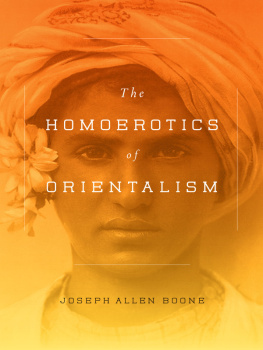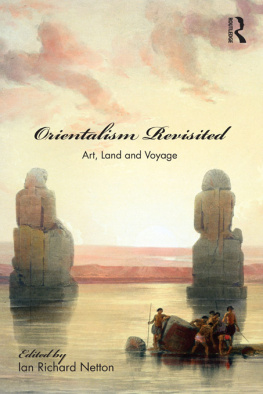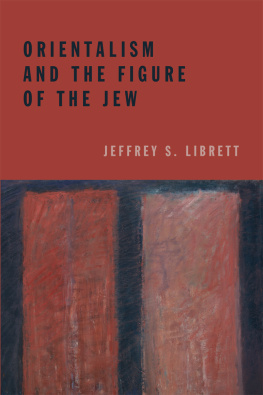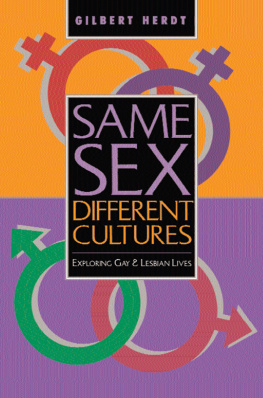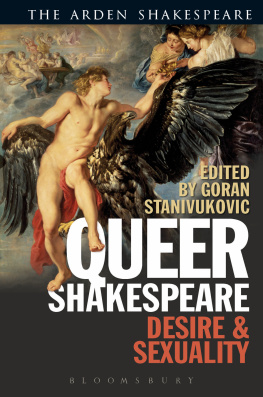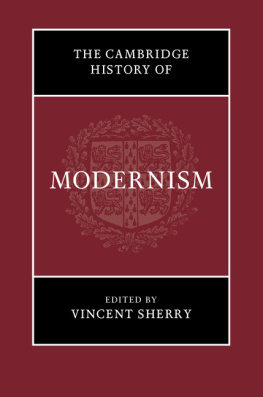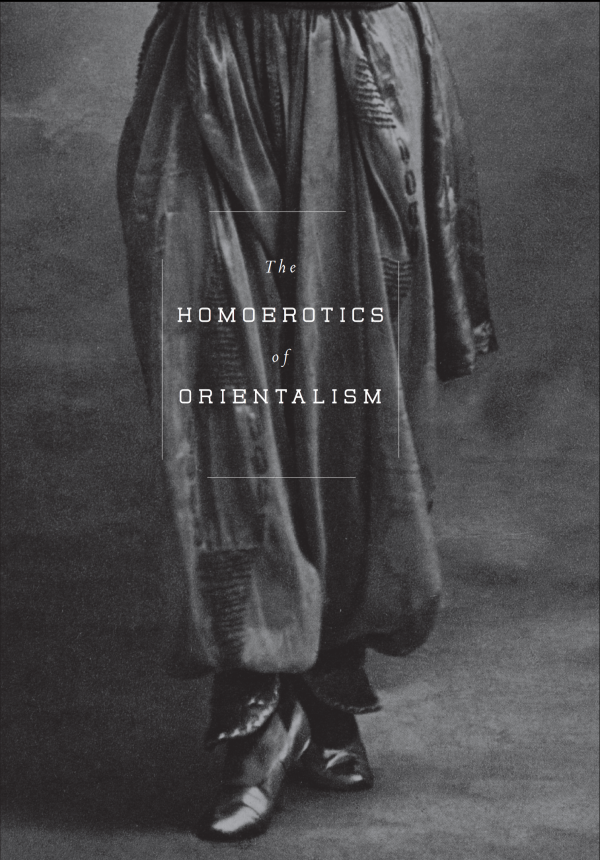COLUMBIA UNIVERSITY PRESS
Publishers Since 1893
New York Chichester, West Sussex
cup.columbia.edu
Copyright 2014 Columbia University Press
All rights reserved
EISBN: 978-0-231-52182-6
Library of Congress Cataloging-in-Publication Data
Boone, Joseph Allen.
The homoerotics of Orientalism / Joseph Allen Boone.
pages cm
Includes bibliographical references and index.
ISBN 978-0-231-15110-8 (cloth : alk. paper) ISBN 978-0-231-52182-6 (ebook)
1. Homosexuality in literature. 2. Eroticism in literature. 3. Orientalism in literature. 4. Homosexuality in art. 5. Orientalism in art. 6. European literatureHistory and criticism. 7. Middle Eastern literatureHistory and criticism. 8. OrientalismEurope.
I. Title.
PN56.H57B66 2014
809'.93353dc23
2013030656
A Columbia University Press E-book.
CUP would be pleased to hear about your reading experience with this e-book at .
Cover image: Rudolf Lehnert, Jeune Kayble en Algerie (orig. 1914, retouched with gouache and pastels 1932). Courtesy of the Muse LElyse, Lausanne, and Edouard Lambelet.
Cover design: Evan Gafney Design
Book design: Lisa Hamm
References to websites (URLs) were accurate at the time of writing. Neither the author nor Columbia University Press is responsible for URLs that may have expired or changed since the manuscript was prepared.
In Memory of
TIMOTHY COOK
19542006
brilliant political scientist, devoted friend to many, extraodinary raconteur, and unrepentant Francophile
CONTENTS
O ur writing projects not only take time but sometimes need to find their time. This has certainly proved true of The Homoerotics of Orientalism, a project I conceived in the 1990s. A stint chairing my department in the first half of the next decade, however, not only interrupted its process but left me wondering whether Id ever have the energy to write a book again. To make matters worse, when I looked back at the shape of the book Id outlined and the articles on the subject Id published, I felt the material seemed dated, part of a moment in postcolonial theory that had already passed. Luckily, a fellowship at the Huntington Library awaited the end of my tenure as chair, and I figured that, if nothing else, I still knew how to read and researchand what more beautiful location to do so than at the Huntington? As luck would have it, working my way back into both of those activitiesreading and researchnot only rekindled my interest in this project; it precipitated a series of discoveries and epiphanies that gave it a new lease on life: revised thesis, historical depth, an expanded cross-cultural frame of reference, entirely new chapters.
), my original thesis about Orientalisms homoerotic undercurrents gained new traction, along with a historical density and cross-cultural frame of reference that fundamentally transformed what I wanted to say and how I wanted to say it.
In a nutshell, I discarded virtually everything Id previously written (perhaps 30 pages survive in this book) and, in the summer of 2007 I started all over, beginning on page one. Now, six years later, I feel the result is a book that has finally found its moment. More than ever, the arguments and narratives of cross-cultural exchange unfolded in The Homoerotics of Orientalism hold relevance for our present day, in which Middle Eastern politics and culture loom large on the world stage. At the same time, this contemporary moment is one in which the politics of sexualityincluding break-through victories for gays and lesbianscontinue to trigger passionate feelings and vehement reactions at home and abroad. If there is any lesson to be extracted from the long process of this books emergence, then, it is the simple fact that a delay in ones best-laid plans is sometimes the best thing that can happen to ones scholarship: today this book offers a perspective that, in its earlier formulations, it could never have dreamt of encompassing, for the resources were not yet available to make its present scope conceivable.
Portions of this book grew out of their earlier articulations in the following articles and essays: Modernist Re-Orientations: Imagining Homoerotic Desire in the Nearly Middle East, Modernism/Modernity 17.3 (2010): 561605; Vacation Cruises; or, The Homoerotics of Orientalism, PMLA 110 (1995): 89107; Rubbing Aladdins Lamp, in Negotiating Lesbian and Gay Subjects, ed. Monica Dorencamp and Richard Henke (NY: Routledge 1994): 14976; and Mappings of Male Desire in Durrells Alexandria Quartet, South Atlantic Quarterly 88 (1989): 4077. The author is grateful to all these presses for permission to reprint and reproduce aspects of these materials.
A number of fellowships have made this book a reality, and I am immensely grateful for the support given by the Huntington Library (in conjunction with the USC Early Modern Studies Institute), Guggenheim Foundation, National Humanities Center, Liguria Study Center for the Humanities and Arts, and Rockefeller Foundations Bellagio Center. The last three of these fellowships were residencies which, however differing in length, provided the opportunity of daily refining my ideas by rubbing them up against some of the sharpest minds Ive ever met. The entire group of fellows at the Liguria Center in Bogliasco, Italy, formed a magical circle in which creativity abounded among us all: Wendy Mitchinson, Erminia Ardissimo, Carlos Vazquez, Sandro Del Rosario, Matthew Sullivan, Karin Guisti, Rex Lingwood, Tiffany Mills, Jennifer Compton, Maria Clemmon Garcia, and Andrew Sundstrom. At the NHC in North Carolina, Mia Bay, Ellen Stroud, Michael Kulikowski, Jered Farmer, Mariella Bacigalupo, and Don Solomonalong with a staff of exemplary librarians including Eliza Robertson, Jean Stroud, and Josiah Drewrystood out among the many presences whose inspiration and friendship made going to the Center each morning a joy rather than a chore; it was at the NHC, moreover, that I began to amass the bulk of the visual materials that compose the final two chapters, another turn that I would not have expected early on in this project.
Those friends and colleagues who took the time to read and critique parts of this book have my profound gratitude, as do those who have invited me to test out its sometimes controversial contents in public venues at crucial stages of its composition: Moshe Sluhovsky, Rebecca Lemon, Phiroze Vasunia, Bill Handley, Carla Kaplan, Leo Braudy, Martin Meeker, David Romn, Susan McCabe, Deborah Nord, Patsy Yaeger, Wendy Moffat, Ali Behdad, Erin Carlston, Jennifer Wicke, and Mary Ellis Gibson. A special shout out goes to my chair, Meg Russett, who not only made resources available to help fund the color plates included in these pages but who also introduced me to her Istanbul by inviting me to participate in a summer Fulbright program at Boaizi Universityin the process sharpening my awareness of the role that the Ottoman Empire once played in this books subject-matter and, not least, endearing me to a network of friends in Turkey whose warm generosity has proved unstinting on subsequent research trips: zlem t, Kaan Bican, Kim Fortuny, Adem Gzel, Hande Tekdemir, and Gunvald Ems, among many others. In seeking assistance in translating Ottoman and modern Turkish sources, I was lucky to be able to draw on the talents of Fatih Kursan, Yekta Zulfikar, and N. Evra Gunhan; other questions of translation were adeptly fielded by Megan Reid concerning Arabic, Phiroze Vasunia concerning Greek and Latin, and my close friend Jack Yeager concerning the finer points of French.

